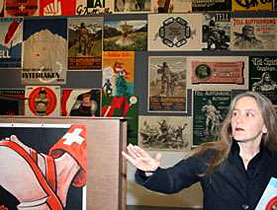Saving the past for the future

An important part of the world's heritage is in danger of crumbling away, and most people are quite unaware of the fact.
Three years ago Unesco – the United Nations Educational, Scientific and Cultural Organisation – declared October 27 to be the World Day for Audio Visual Heritage, in order to bring the issue to public attention.
Switzerland is already facing up to the challenge. The Memoriav association was set up in 1995 by several institutions concerned with archives and historical documents. Its task is to discover and preserve Switzerland’s audiovisual documents – videos, films, sound recordings and photographs.
On its website, Memoriav describes this heritage as a reflection of recent Swiss history, which “bears witness to the cultural and linguistic variety of our country”.
And yet often these unique and powerful documents are treated as poor relations.
“In the collections of museums, archives and libraries, audiovisual documents have a lower status than printed and written materials,” Memoriav director Kurt Deggeller told swissinfo.
“There is a real need to promote the value of these documents – and to promote also the urgency of preserving this heritage, because it’s particularly fragile. Many documents have already been destroyed.”
Networking
Memoriav works by networking different institutions, promoting the exchange of knowledge and experience between them and giving advice and arranging courses about conservation. Currently there are more than 160 member institutions all over Switzerland.
It does not hold any documents itself, but has indexed works to make the material more widely available and put many of them on its memobase database.
One major category of user is in universities. The documents are useful not only to historians, but also to folklore experts and linguists. But there are other potential users as well.
“We are promoting the use of audiovisual documents by schools at every level,” Deggeller explained. “Not only as illustrations, but also to train children to read the images they hear and see every day at home on their television, radio or computer.”
The range of subject matter held in the different archives is naturally immense. The photos range from scenes of everyday life, to dramatic or historical events, to portraits of the famous and the unknown. There are news broadcasts and recordings of important speeches, interviews, radio plays and musical performances. There are documentaries and classic feature films, advertisements, and training and propaganda films.
Cultural diversity
Deggeller picked out yet another category as being of special interest.
“The sound recordings include traditional music. The films often describe old traditions in Switzerland and these are particularly important to be preserved. This is why we have chosen cultural diversity as the theme of this world day,” he said.
The task of physically preserving these documents is daunting. They were produced on material supports that have not lasted. For example cellulose nitrate film, which was used until the 1950s, is flammable, and needs to be transferred to a more stable medium. The cellulose acetate and triacetate which replaced it also decays over time.
Even the most modern audiovisual medium, the video, poses huge problems. Few videos from the 1970s still survive. One format has constantly replaced another, with the result that it is hard to find equipment which will play them.
Finance
Deggeller is relatively optimistic about the future. He says Switzerland has made a lot of progress in the last 20 years, and especially since the creation of Memoriav.
“We now have good contacts between broadcasters and libraries and archives, which is not always the case in other countries,” he said.
“One of our most important tasks is to inform politicians about the situation and once they are informed normally they are willing to act, and to give us what we need.”
Memoriav currently receives central government funding of SFr3 million ($2.6 million) per year, and obtains about the same amount from other sources.
Of course it’s not enough, but Deggeller is realistic enough to know that he cannot ask for too much. “It’s important that with the little money we have at our disposal we can make a maximum number of projects” he comments.
Since public money has been used to save the material and to make it accessible, the material is normally provided free to the public for non-commercial use.
Whether to wallow in nostalgia or to discover an unknown Switzerland, anyone can visit Memoriav’s memobase and plunge themselves into the history of the 20th century.
swissinfo, Julia Slater
Memoriav was set up in 1995 to index and preserve audiovisual documents.
The founding members included the Swiss Broadcasting Company – SRG SSR idée suisse, the parent company of swissinfo.
The others were:
The Federal Office of Communications, Biel/Bienne
The Swiss Federal Archives, Bern
The Swiss Film Archive, Lausanne
The Swiss National Library, Bern
The Swiss National Sound Archives, Lugano
In 1998 the founding members were joined by the Swiss Institute for the Conservation of Photography, Neuchâtel.
Its online memobase contains metadata of about 250,000 audiovisual records, divided as follows:
Photography: 26,427 (12%)
Sound/Radio: 41,517 (18%)
Film: 7,208 (3%)
Video/TV: 149,900 (67%)
Memoriav has an annual budget of SFr3 million ($2.6 million) from the state plus about the same amount from other sources.

In compliance with the JTI standards
More: SWI swissinfo.ch certified by the Journalism Trust Initiative












You can find an overview of ongoing debates with our journalists here . Please join us!
If you want to start a conversation about a topic raised in this article or want to report factual errors, email us at english@swissinfo.ch.